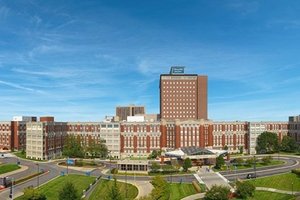
- Kim Kisner
- Business
- 06/20/2022
Chip Amoe, the Health System's First Director of Sustainability Takes a Deep Dive in Systemic Challenges

Health care leaders have the uniquechallenge of improving the health and well-being of the individuals, neighborhoods, and communities they serve while simultaneously working to minimize negative and health-depreciating impacts on the environment.
We spoke to Chip Amoe, who became Henry Ford Health’s first director of sustainability in 2018, about the challenges and successes he faces as he leads HFH to become more ‘green.’
Founded in 1915 by Henry Ford himself, Henry Ford Health is a not-for-profit, academic, and integrated health system comprising five acute-care hospitals, three behavioral health facilities, a health plan, and 250-plus care sites including medical centers, same-day, and urgent care clinics, pharmacies, eye care facilities, and other health care operations.
The health system has more than 33,000 employees and nearly 6,000 physicians and researchers.
Amoe took on the role with a conviction that HFH can work to lead by example and help influence the sustainability policies and actions of government officials and other businesses in the state and region.
His original initiatives focused on reducing plastic and Styrofoam waste, exploring ways to reduce greenhouse gas emissions through energy reduction, and standardizing efforts across the system.
Toward the goal of reducing greenhouse gas emissions, in December 2021 Henry Ford announced they will begin purchasing wind and solar energy through DTE’s voluntary renewable energy program, MIGreenPower.
Amoe says,
Our overall goal here is to reduce scope 1 & 2 emissions by 50% by 2030. To do that we need to reduce emissions from purchased energy. We plan to start purchasing this renewable energy in 2023, the earliest it will be available, and ramp it up over time.
To that end, initially, 10% (approximately 19,100 mega-watt hours) of Henry Ford’s total electricity purchased from DTE will come from Michigan-made renewable energy, increasing incrementally to 100% by 2029.
Henry Ford’s clean energy commitment with DTE will begin in late 2023. The organization states its initial purchase will reduce greenhouse gas emissions by roughly 13,536 metric tons, the equivalent of removing 2,944 passenger vehicles from the road each year.
In terms of setting longer-term goals, Amoe said, “There are several national organizations that have developed green healthcare standards for healthcare systems. Taking those into consideration, we also felt it was important to turnto our internal priorities that align directly with our mission of improving the health of the communities we serve and that link health and sustainability.”
The following five goals are derived from that exercise:
- Reduce emissions from operations
- Eliminate chemicals of concern, i.e. furnishings, cleaning chemicals, certain medical devices
- Reduce waste to landfills, such as bottled water, food waste, packaging, and utilizing reprocessed equipment
- Increase the purchase of local and sustainable food
- Increase the investment in green and healthy infrastructure, such as green spaces, stormwater management, advocacy around public transportation and employee commuting, and more
When asked what pitfalls Henry Ford Health faces in implementing green efforts, Amoe cited two large challenges.
“Data collecting is a huge challenge,” he said. “When I came on board I assumed the information was being collected and housed so that we could track it. But I quickly learned that wasn’t the case.We’re a large, complex system and there are multiple data sources maintained by multiple departments so you inevitably come to understand thereare gaps in the information. And you can’t move what you can’t measure. We are working to streamline our data collection efforts and it’s a long process.”
The second challenge is the state of the U.S. recycling market.
Just as I started my role in 2018, China announced that it would no longer be accepting recycled material from the U.S. This has been a big hit to the U.S. recycling market and made it much more challenging. Combine that with low landfill tipping fees in the state and the lack of recycling infrastructure in the region and that means recycling is often more expensive than throwing things away.
Despite the challenges, Amoe and the Henry Ford team have implemented several initiatives in the past four years, including:
- Reducing the use of more potent anesthetic gasses from operating rooms to reduce emissions
- Eliminating Styrofoam from all their retail locations
- Upgrading exterior lighting to reduce energy waste
- Hosting their first zero-waste event
They have also partnered with Friends of the Rouge to create raingardens at their new Plymouth medical center and south campus to divert stormwater and offer green space.
When asked what the health care industry could improve on to forward sustainability efforts, Amoe said “it’s important to come together as an industry around common standards, and work with outside vendors as an industry to request and gather data in a common format so that vendors know how they can help us meet our shared goals of improving the health of our communities
Additionally, the Michigan Health and Hospital Association Green Health Care Committee – which Amoe chairs – recently launched an MHA-approved Health Care Sustainability Road Map to give health systems a place to start when it comes to sustainability. “We are working to develop common standards and to provide resources to hospitals in Michigan and beyond.”
In the end, Amoe says, “We hope to demonstrate to our staff, patients, vendors, and surrounding businesses the connection between health and sustainability, and further, to facilitate positive choices that impact the overall health of our community.”
Be sure to subscribe to our newsletter for regular updates on sustainable business practices in and around Detroit.
Kim Kisner
- All
- Business
- Community
- Education
- Events

ZF Group, a global technology company with its North American headquarters in Northville, specializes in systems for passenger cars, commercial vehicles, and industrial technology. With a focus on next-generation mobility, the company develops solutions that address electrification, automation, and digitalization while aiming to improve safety, efficiency, and sustainability in transportation. SBN Detroit interviewed Anuj Shah, Sustainability Lead, for the Americas, to explore the most pressing environmental challenges in...

The Chip Bag Project, based in Detroit, is a sustainability initiative that upcycles hard-to-recycle snack packaging — particularly chip bags — into insulated sleeping bags for individuals experiencing homelessness. Founded by Eradajere Oleita, the project addresses both environmental waste and housing insecurity by transforming materials like Mylar into practical, thermally efficient solutions. In June, Oleita was among Trelllis’s 30 Under 30, its annual recognition of the brightest young...

PowerPanel, headquartered in Oxford, focuses on sustainable energy technology with a particular emphasis on hot water systems and thermal energy capture. The company designs and manufactures modular solar hybrid systems that integrate both photovoltaic and thermal components into a single unit. Its goal is to offer energy solutions that are more efficient, durable, and economically viable for a range of commercial and industrial applications. SBN Detroit interviewed Garth...







